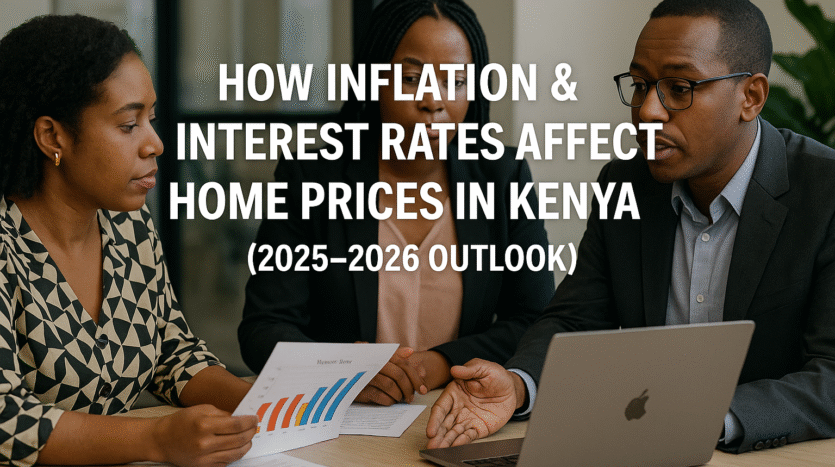How Inflation & Interest Rates Affect Home Prices in Kenya (2025–2026 Outlook)
Kenya’s property market continues to evolve in 2025, shaped by inflation trends and interest rate policies from the Central Bank of Kenya (CBK). These two economic factors play a major role in determining home prices, mortgage affordability, and investment opportunities across Nairobi and other urban centers.
Understanding how inflation and interest rates will impact housing in 2025 and 2026 is essential for buyers, investors, and developers planning their next move in Kenya’s vibrant real estate sector.
💹 Inflation Trends in Kenya (2025–2026)
Inflation represents the general increase in prices across the economy from fuel to food to construction materials.
In 2025, Kenya is projected to experience moderate inflation, hovering between 5–7%, as the CBK maintains a tighter monetary stance to stabilize the shilling and reduce import-driven price pressures.
Here’s how inflation will likely affect the housing market through 2026:
- Higher Building and Land Costs
As inflation raises the cost of cement, steel, and imported finishes, developers will face rising construction expenses. Expect home prices to rise gradually, especially in Nairobi’s upper-middle and luxury segments like Kileleshwa, Lavington, and Runda. - Reduced Consumer Purchasing Power
High inflation squeezes disposable incomes, making it harder for households to save for deposits or service mortgages.
This will keep demand strong in affordable housing projects such as those in Ruiru, Athi River, and Joska, where developers target price-sensitive buyers. - Property as a Safe Haven
In uncertain times, real estate remains a solid hedge against inflation. Investors are expected to shift their focus from volatile assets to rental and land investments that preserve value through 2026.
💰 Interest Rates and Their Impact on Housing
Interest rates set by the Central Bank of Kenya directly influence the cost of borrowing for both homebuyers and developers.
Here’s what to expect in 2025 and 2026:
- High but Stabilizing Interest Rates in 2025
Following rate hikes in 2023 and 2024 to control inflation, the CBK maintained a tight stance into 2025.
The CBR (Central Bank Rate) is expected to remain around 12.0% in early 2025, keeping mortgage rates elevated between 14–17%.
This environment may slow down home purchases and encourage developers to focus on rent-to-own and flexible payment plans. - Possible Rate Cuts in Late 2025 or 2026
As inflation stabilizes, analysts project a gradual easing of interest rates in late 2025, continuing into 2026.
Lower lending rates will make mortgages more accessible, likely sparking renewed housing demand and price appreciation particularly in Nairobi’s growing satellite towns such as Thika, Kitengela, and Ngong. - Impact on Developers and Investors
High rates raise financing costs for developers, delaying some projects in 2025. But once rates ease, expect increased project launches in 2026 especially for mixed-use developments and affordable housing projects supported by government initiatives.
📊 Housing Market Snapshot: 2025–2026
| Factor | 2025 Trend | 2026 Outlook |
|---|---|---|
| Inflation | Moderately high (5–7%) | Expected to ease slightly |
| Interest Rates | High but stable | Gradual decline anticipated |
| Construction Costs | Rising | May stabilize by mid-2026 |
| Home Prices | Slow growth | Moderate increase as rates drop |
| Mortgage Uptake | Limited | Likely to rise in late 2026 |
| Investment Demand | Strong in rental markets | Expanding into new urban areas |
🏗️ What Buyers & Investors Should Do
- Homebuyers (2025): Focus on negotiating flexible payment options or explore affordable housing schemes before rates drop.
- Homebuyers (2026): Take advantage of expected rate cuts to secure mortgages at better terms.
- Investors: Acquire property in developing towns while prices are still moderate. Returns are expected to rise once demand rebounds in 2026.
- Developers: Hedge against construction cost inflation and prepare for increased buyer activity when rates start easing.
📈 Long-Term Real Estate Outlook
Despite short-term challenges, Kenya’s real estate market remains resilient. Urbanization, infrastructure expansion (like the Nairobi Expressway and Eastern Bypass upgrades), and the government’s Affordable Housing Programme continue to support strong demand.
By 2026, with inflation easing and borrowing costs falling, Kenya’s property market is expected to enter a new growth phase, benefiting both homeowners and investors.
🔗 Related Reads
- What CBK’s Latest Rate Cut Means for Homebuyers & Developers in 2025
- How to Finance an Apartment Purchase in Kenya
- Foreign Investment and Kenya’s Housing Market
- Top Amenities That Attract Renters in Nairobi Homes
- Appeal of Mixed-Use Developments in Nairobi
📞 Call: +254 700 563 667
📧 Email: sarabirealtygroup@gmail.com
💬 Chat with us on WhatsApp

